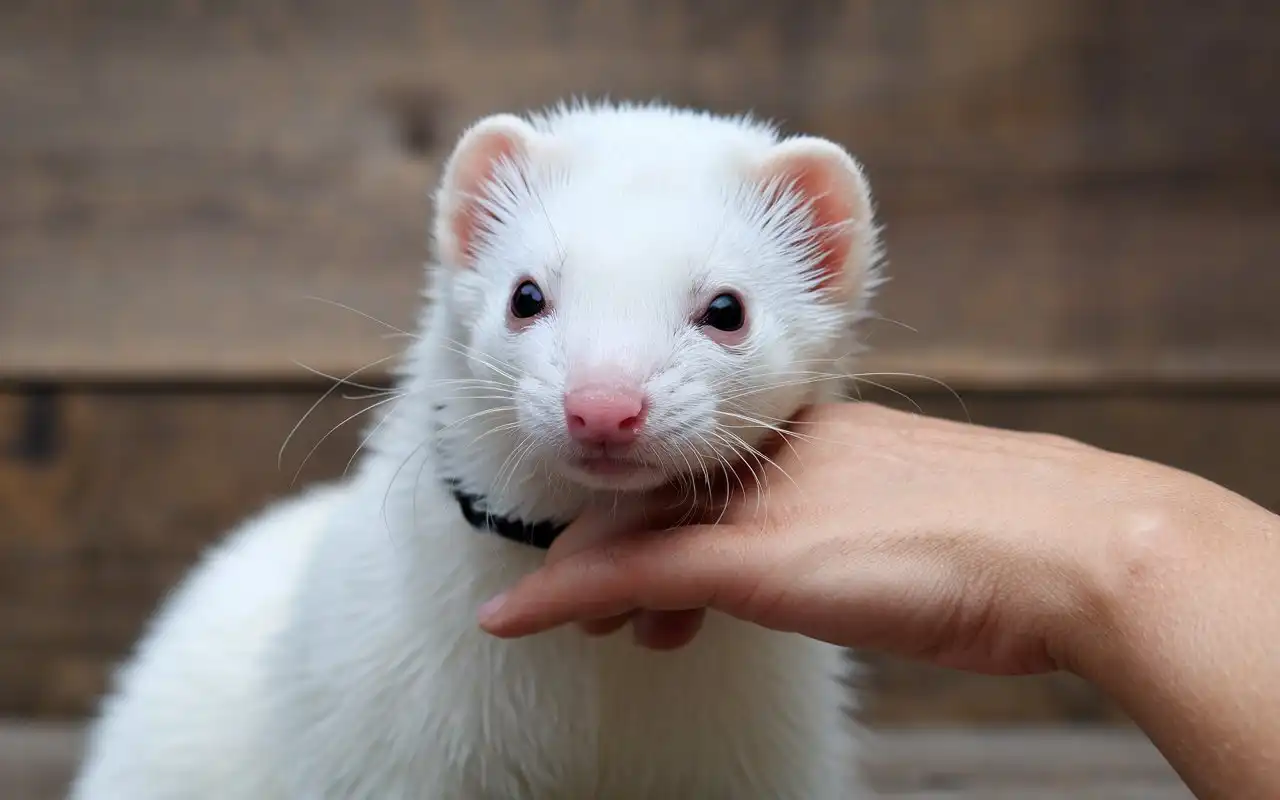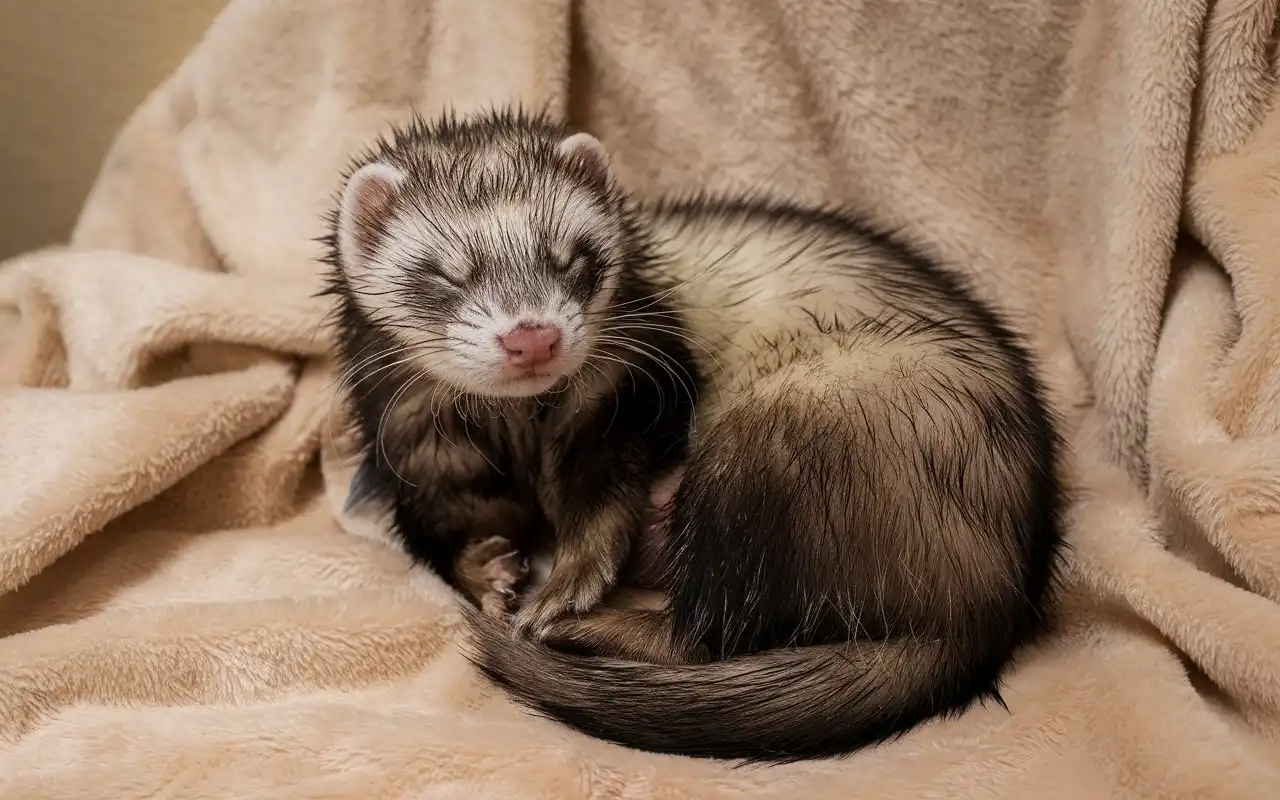Descenting a ferret interests many current and potential owners. They want to manage these pets’ natural, musky smell. Ferrets are lively and affectionate. They are great companions. But their scent glands can produce a strong odor that some may find overwhelming. This article covers all you need to know about descenting. It discusses the procedure, its pros and cons, and other odor-control methods. Understanding descenting can help you. It will let you make choices that improve your ferret’s comfort and create a pleasant home for all.
Table of Contents
Descenting a Ferret: Why It Matters
Descenting a ferret is a hot topic among pet owners. It’s especially so for those sensitive to strong smells. Ferrets are adorable and playful. But, they have a strong musk that can be a challenge for some people in a home. Descenting involves surgically removing a ferret’s anal scent glands. This can greatly reduce the smell. Descenting doesn’t remove all ferret odors. But, it helps. It makes for a cleaner living space.
Many owners choose to descent their ferrets. It controls smell and makes social interactions more pleasant. Ferrets can release a strong scent when frightened or excited. Overall, descenting balances these furry friends’ natural habits with typical household expectations. It enhances the bond between the ferret and its owner.
Benefits of Descenting a Ferret Owners and Pets
Descenting a ferret has several benefits for both ferrets and their owners. Lessening the strong scent from ferret glands makes owners more likely to keep them indoors. There, they can interact more and bond with their pet. Also, descented ferrets are often more accepted by others. Some may not tolerate the natural musk as well as the pet owner does. For the ferret, this means they are less likely to be isolated due to smell. Also, descenting can reduce a ferret’s urge to spray or mark. This is a common behavior when their scent glands are intact. This change can reduce their stress in shared spaces. It will make for a happier, more comfortable pet.

What is Descenting a Ferret?
Explanation of the Descenting Process
Descenting a ferret is a surgery that removes a ferret’s anal scent glands. These glands cause most of their unique smell. A veterinarian will perform the surgery. It is simple but requires precision and care to ensure the ferret’s well-being. The scent glands are near the rectum. The vet will make small incisions to remove them, ensuring minimal discomfort for the ferret. This procedure is generally performed under anesthesia, ensuring that the ferret feels no pain. However, descenting doesn’t entirely remove a ferret’s odor; instead, it significantly reduces it. After descenting, the ferret’s body still produces its natural musk through its skin. So, owners should expect a mild scent.
This process is now more common in countries with pet ferrets. It helps owners sensitive to animal odors by improving their homes.
Differences Between Descenting and Other Procedures
In ferret care, it is vital to distinguish descenting from other procedures, like neutering or spaying. Neutering means removing the reproductive organs. It aims to stop ferret breeding and control hormone-driven behaviors, like aggression and marking. Spaying or neutering, especially in male ferrets, can indirectly reduce odor, but this is often minimal. In contrast, descenting removes the glands that cause the foulest odors. Neutering has behavioral benefits and prevents some health issues. Descenting a ferret is only to control odor. Some owners choose to do both, especially if their pet’s behavior and smell are a concern. By knowing these differences, owners can make better choices. This will ensure their pet’s health and well-being match the desired living conditions.
Why Do Ferrets Smell?
Natural Causes of Ferret Odor
Ferrets naturally have a musky odor, which comes from their skin, glands, and diet. This scent helps them communicate, identify each other, and establish territory. Unlike other pets like dogs or cats, ferrets rely on their natural scent to express themselves. It’s worth noting that the intensity of a ferret’s odor can vary, influenced by diet, health, and environmental factors. High-protein diets, typical for ferrets, can make their odor more noticeable. Furthermore, the smell can be stronger during hormonal changes, such as when a ferret goes into heat. While descenting a ferret can reduce the gland-specific odor, some scent will remain a part of living with a ferret.
Role of Scent Glands in Ferret Smell
The anal scent glands are the primary contributors to a ferret’s strong musk. When a ferret is scared or stressed, it may “scent.” This means it releases a burst of odor from its glands. It’s both a defense and a way to communicate. In the wild, ferrets rely on these glands to mark their territory and signal to others. Even in domesticated environments, the scent glands keep this purpose. Descenting removes these glands. It’s not essential for all ferrets. Many owners manage the scent with regular cleaning and care. Descenting a ferret can help reduce these scent releases. They are common in high-stress situations, like vet visits or sudden loud noises.
Understanding the Scent Glands in Ferrets
Anatomy of Scent Glands in Ferrets
Ferrets have two primary scent glands located near the anus, which they use for territorial marking and communication. These glands secrete a thick, musky liquid with a distinct smell. Ferrets release it intentionally during certain behaviors. Structurally, these glands are quite similar to those found in skunks, though a ferret’s scent is far less potent. The glands produce a secretion that builds up and is expelled when a ferret feels threatened or stressed. Some pet owners report that descenting a ferrets stops their marking. Removing the glands reduces their ability to release a strong scent.
Why Ferrets Use Scent Glands
Scent glands are an essential part of a ferret’s behavior in the wild. These glands help set social boundaries. They also ward off threats and signal other animals. By releasing a strong scent, ferrets can communicate “this area is mine” or “stay away.” This behavior, while natural, isn’t always necessary in a domestic setting. Descenting helps minimize these behaviors, making ferrets more compatible with domestic life. Descenting helps ferrets adapt to shared spaces where scent-marking isn’t helpful.

The Pros and Cons of Descenting a Ferret
Pros: Reduced Odor and Improved Living Environment
Descenting a ferret has several advantages. The main one is less odor. This creates a more pleasant home. This is especially helpful for those sensitive to strong scents. It’s also good for those in shared spaces, like apartments, where odors are more noticeable. By descenting, owners can cut the “musky” smell. This makes it easier to keep ferrets indoors without an overpowering odor. This change often leads to a closer bond between owners and their pets. Ferrets can now roam more areas of the home. Also, descented ferrets are more welcome around visitors and other pets. This helps ease any tension between family or friends who may be wary of pet ferrets.
Cons: Health Considerations and Ethical Debate
Despite its advantages, descenting is not without drawbacks. Health risks, like infection and anesthesia complications, can occur during or after the procedure. Also, removing scent glands alters the ferret’s behavior. Some argue this is unethical. Scent glands are key to a ferret’s instincts. Removing them may harm their social interactions. Some animal welfare advocates believe that descenting a ferret harms a ferret’s natural behaviors. They suggest that responsible care practices are better. These include frequent cleaning and a proper diet. The ethical debate is ongoing. Owners must weigh both sides before deciding.
Is Descenting a Ferret Necessary?
Situations Where Descenting is Recommended
Descenting isn’t always necessary for every pet ferret. Some owners find that with good hygiene, regular grooming, and a proper diet, ferret odor can be managed without surgery. However, in certain cases, descenting may be highly recommended. If a ferret often scent-marks, or if someone in the house is sensitive to strong smells, descenting can help. It can also help if multiple ferrets are housed together, as reducing odor can ease the introduction of new animals into a shared space. For owners of small, poorly ventilated homes, descenting may be better. It helps with air quality and reduces animal musk.
Alternative Methods for Managing Ferret Odor
There are several effective alternatives to descenting for managing ferret odor. Regular cage cleaning, quality bedding, and proper diet can all contribute to reducing smell. Daily cleaning of a ferret’s space and litter box reduces waste and odor. Ferrets thrive on high-quality, protein-rich diets. Diets with too many fillers can make their smell stronger. Also, some owners find success with weekly baths or pet-safe, unscented wipes. Combined, these options can often control odors. This makes descenting a ferret is unnecessary. They also preserve the ferret’s natural behaviors.
How to Descent a Ferret
Preparation for the Procedure
If you decide to proceed with descenting, preparation is key. Consult a vet experienced in ferret care. Not all vets are skilled in descenting procedures. In the first visit, your vet will check your ferret’s health. This is to ensure it is fit for surgery. You should ask about the process, risks, and recovery time. This will prepare you for post-surgery care. Make sure to create a quiet and comfortable recovery space at home with clean, soft bedding. It’s also best to reduce stressors, like loud noises and other pets, during this time to aid recovery.
Choosing the Right Veterinarian
The success and safety of descenting largely depend on choosing a qualified veterinarian. Look for a vet who has experience with ferrets, as they have unique needs compared to other pets. When discussing the procedure, ask about their experience. How many ferrets have they safely descented? Do they use any special techniques to minimize discomfort? Also, a reputable vet will give clear instructions. They will help you understand the risks, benefits, and options. Finding the right vet is vital. It ensures your ferret gets the best care during this delicate procedure.

Post-Procedure Care for Descented Ferrets
Recovery Tips and Comfort Measures
Post-operative care is crucial for a descented ferret’s smooth recovery. Immediately after the procedure, allow your ferret to rest in a quiet and clean area with minimal distractions. They may be drowsy or sensitive to touch for the first few days, so avoid excessive handling. Use soft, absorbent bedding to keep them comfortable, and change it frequently to prevent any infections. Additionally, check your ferret’s food and water intake closely. Reduced appetite or dehydration can signal discomfort, so consult your vet if any unusual symptoms arise. With gentle care, most ferrets recover within a week or two, resuming their usual activities with ease.
Monitoring Health After Descenting
Keeping a close eye on your ferret’s health post-surgery is essential. Look out for any signs of infection, such as swelling, redness, or discharge at the surgical site. These symptoms may mean the healing process is at risk. They need prompt veterinary attention. Also, pay attention to changes in your ferret’s behavior or energy levels. If they seem excessively lethargic or refuse food, consult with your vet to ensure that there are no underlying issues. Regular check-ups after the surgery can assure you. They can confirm your ferret is recovering and regaining strength.
Alternative Odor-Control Methods for Ferret Owners
Proper Diet for Reducing Smell
A ferret’s diet plays a significant role in managing odor. High-protein, low-carbohydrate diets help keep a ferret’s natural musk at a manageable level. Protein-rich foods support healthier skin and coat, which can lead to a less intense natural scent. Avoid foods high in fillers, as these ingredients can exacerbate the smell of both skin and waste. Many ferret owners prefer raw or special diets. They are closer to a ferret’s natural food and can improve digestion. By focusing on diet, you can achieve a healthier, less odorous pet without the need for descenting.
Cleaning Techniques for Odor Management
Regular cleaning is perhaps the most effective way to manage a ferret’s odor. First, wash their bedding weekly. Then, disinfect the cage every few days with ferret-safe cleaners. Cleaning the litter box daily can also make a significant difference, as accumulated waste is often the main source of odor. Some owners find that odor-neutralizing sprays and activated charcoal reduce the smell. Also, occasional baths or wipes help control your ferret’s skin oils. They contribute to your ferret’s natural scent.
Common Myths About Descenting a Ferret
Myth vs. Reality: What You Need to Know
There are several myths about descenting that can lead to misunderstandings. One common myth is that descenting a ferret will completely eliminate all ferret odor. In reality, descenting only reduces the smell associated with the anal glands; the natural musk from a ferret’s skin and body remains. Another misconception is that descenting will drastically change a ferret’s behavior. However, descenting doesn’t affect their playful, social nature. It just reduces their anal-gland-related marking behavior. Knowing these myths helps potential owners. They can then set realistic expectations and make informed decisions about descenting.
Descenting Laws and Regulations
Understanding Legal Guidelines in Different Regions
The legality of descenting varies by region. Some areas have laws on animal welfare and elective surgeries. In the UK and parts of Europe, descenting is restricted or discouraged. It’s seen as a non-essential procedure. In the U.S., descenting is more common and accepted. This is especially true in states where ferrets are popular pets. It’s crucial to check with local regulations and veterinary boards to ensure compliance with legal guidelines. These rules help owners make ethical, lawful choices.

Ferret Behavior and Descenting
Impact of Descenting a Ferret Temperament and Bonding
Descenting is unlikely to alter a ferret’s personality or temperament, as it doesn’t affect the brain or hormonal functions. Some owners find that descented ferrets scent-mark less. So, they smell less during interactions. This change can ease a stronger bond between ferret and owner, as it creates a more pleasant environment for both. Ferrets are social animals. A clean, odor-controlled space helps owners spend time with them. This promotes trust and companionship, free from strong smells.
Potential Health Risks of Descenting a Ferret
Understanding Surgical Risks
Like any surgery, descenting has risks. These stem from the anesthesia and the chance of infection. Ferrets are small animals. Their unique anatomy makes them sensitive to some anesthetics. This sensitivity means that even minor errors could harm their health. Experienced vets often take extra care with anesthesia to reduce risks. But owners should know that no surgery is without danger. Also, the incision sites near the scent glands may get infected if post-surgery care is poor. Follow your vet’s advice. Provide a sterile recovery environment. This will lower the risk of infection and speed up healing.
Long-Term Health Considerations
Some descented ferrets may have minor long-term health issues. This is especially true if the surgery was done poorly or at a very young age. In some cases, the removal of scent glands could affect a ferret’s digestive system, as these glands are closely linked to other bodily processes. In very rare cases, poor descenting could cause bowel issues or scent-marking problems. You can reduce these risks by using an experienced vet. Also, monitor your ferret’s health regularly. It’s vital to notice any changes in behavior, appetite, or stool. This helps spot and fix potential issues early.
Cost of Descenting a Ferret
Expected Financial Investment
Descenting a ferret can be a significant financial commitment. The cost of the procedure typically ranges from $100 to $300, depending on the veterinarian, location, and specific needs of your ferret. This cost generally includes pre-op exams, anesthesia, the surgery, and any post-op care or meds. In specialized veterinary practices, descenting can be more expensive. This is especially true if pre-surgical tests are needed to ensure the ferret is a suitable candidate. It’s essential to budget for these costs. Also, consider post-surgery care expenses, like antibiotics or pain relief.
Weighing the Cost Against Alternatives
For some pet owners, the cost of descenting a ferret may seem high, particularly if they’re already managing other pet expenses. Alternatives like regular cage cleaning and high-quality diets can be cheaper. They can also reduce odors. So can odor-neutralizing sprays. It is crucial to weigh the costs of descenting against these non-surgical methods. This will help make a wise financial decision. Many owners find that good hygiene and a proper diet work. They avoid the extra cost of surgery. Ultimately, understanding all options allows owners to choose the best path for both their budget and their pet’s well-being.
Conclusion
Descenting a ferret can effectively reduce odor, yet it requires careful consideration. Weigh the pros and cons. Get advice from experts. Explore other options. This will help you find the best choice for you and your pet. This decision should not be made hastily. Regardless of whether they are descented or not, ferrets can be wonderful and devoted companions when properly cared for. Their playful personalities and affectionate nature make them truly special pets. Before proceeding, ensure you understand all aspects of descenting. It’s crucial for a happy, healthy relationship.









